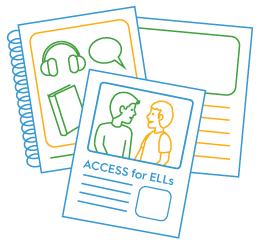Resources/Recursos
Featured Resources



All resources/Todos los recursos
Filter resources by:
Resources/Recursos
District Level Analysis of ELL Growth
This research project explored the patterns of district-level ELL “growth” for the 2007-2011 time period and identified the existence of “high-flying” and “low-cruising” districts within ACCESS for ELLs in terms of ELL growth.
Published May 2013
Author: Narek Sahakyan
Resource Details View Download Now
Released May 2023
Impact of ability range restriction on item characteristics in ACCESS multistage adaptive testing
This report describes how different student ability restrictions may affect item characteristics in the ACCESS multistage adaptive testing, and presents options for item administration in field testing.
Resource Details View Download NowReleased April 2023
Examining English Learner Testing, Proficiency, and Growth: Before, During, and “After” the COVID-19 Pandemic
This report examines English learner testing, proficiency, and growth in the years surrounding the COVID-19 pandemic. This research builds on an October 2021 report on the impact of the pandemic, and includes data from the 2021-22 ACCESS for ELLs test administration. Findings indicate that in some grades and language domains EL's average proficiency and growth have returned to pre-pandemic levels. However, for most grades and language domains the evidence points to a continuing impact of COVID-19 on English learners’ English language development.
Published April 2023
Author: Narek Sahakyan, Glenn Poole
Released April 2023
Supporting Multilingual Learners' Language Growth Through Language Development Portfolios
This Focus Bulletin illustrates how teachers and students can use language development portfolios to interpret and document language growth. The bulletin follows the story of how a grade-level team introduced portfolios to their practice, posing several questions the team asked as they refined their usage. It closes by offering two sample tools that teachers can use and adapt to capture multilingual learners’ language growth using modified Proficiency Level Descriptors (PLDs) from the WIDA English Language Development Framework, 2020 Edition.
Published: December 2022
Authors: Fernanda Marinho Kray, Margo Gottlieb, Lynn Shafer Willner
Released December 2022
Educational Justice Through Policy
In this Focus Bulletin, WIDA revisits landmark legislation and policies that shaped language education in the U.S. It presents unintended consequences on programming and instruction of bi/multilingual students; showcases how field practitioners address language policy and its consequences; and includes tools for reflection, collaboration, professional learning and community engagement.
Published November 2022
Author: Mariana Castro
Released November 2022
Scaffolding Learning for Multilingual Students in Math
This WIDA Focus Bulletin provides examples of specific macro-scaffolding and micro-scaffolding practices in action in a math classroom and includes guidance for developing these scaffolding practices over time.
Published November 2022
Authors: Jen Daniels, Ruslana Westerlund
Released November 2022
Making Science Multilingual: Supporting Equity Through Design Principles
This Focus Bulletin emphasizes how multilingual learners' everyday language can be an asset to science teachers in their efforts to promote classroom engagement. It provides educators with real-world examples and guiding questions to help create learning spaces where sensemaking, co-construction, language development and equity can flourish simultaneously.
Published June 2022
Authors: Rita MacDonald, David Crowther, Jennifer Wilfrid
Released June 2022
Young Multilingual Children in Pennsylvania
In this study, completed for the Pennsylvania Office of Child Development and Early Learning, we explore the perceptions, experiences and decision-making of 13 parents of young multilingual children, ages birth to 5 years. The focus revolves around children’s language learning and development, family engagement practices and children’s participation in early care and education (ECE) programs.
Published 2020
Resource Details View Download NowReleased May 2022
Embedding the Can Do Cycle Throughout the School Year
This Focus Bulletin reframes the WIDA Can Do Philosophy as a can do cycle of actions that can be embedded into teaching and learning experiences throughout the entire school year. In it, we offer resource banks of questions that can be used to elicit student assets and reflect on ways to build on student assets at the beginning of each unit, during each unit, and at the end of each unit.
Published April 2022
Authors: Maya Martinez-Hart, Christina Nelson
Released April 2022
Using WIDA MODEL to support instructional planning for multilingual learners
In this Focus Bulletin, we aim to help readers better understand how WIDA MODEL test scores may be used to support instructional planning decisions for multilingual learners and their teachers. We describe the rich resources available from WIDA to help educators understand what the test scores mean. We also explain how these resources may be used, along with MODEL test scores to help inform where multilingual learners have opportunities to further develop their English language skills.
Published February 2022
Authors: Mark Chapman, Heather Elliott, Jennifer Feldmann
Released February 2022
Interactive Learning with Multilingual Learners in Content-Area Classrooms
This Focus Bulletin explores how interactive learning can benefit multilingual learners. Expressing and co-constructing ideas are discussed as two aspects of interactive learning that are important for the learning and wellbeing of multilingual youth.
Published December 2021
Authors: Jennifer Wilfrid, Daniella Molle
Released November 2021
Examining Growth at the Intersection of IEP and (Long-Term) EL Status
Motivated by findings of a 2018 WIDA report pointing to large overlap between ELs with Individualized Education Program (IEP) designations and those ELs who could be identified as LTELs, this study further focuses on these dual-identified students. Grouping ELs by ever-IEP (i.e., being assigned an IEP at any point in the longitudinal record) and never-IEP status, we compare these two subgroups’ English language growth trajectories across time. Our findings show consistent trends of differential growth and reclassification rates for these two subgroups.
Published November 2021
Authors: Narek Sahakyan, Glenn Poole
Released November 2021
Examining English Learner Testing, Proficiency and Growth: Before and Throughout the COVID-19 Pandemic
This report examines English learners’ (EL) testing, proficiency and growth in the academic years of 2018–19, 2019–20 and 2020–21, using population-level data from ACCESS for ELLs Online, administered across the WIDA Consortium to students identified as ELs. The objective of the report is to shed light on the impact of the COVID-19 pandemic on ELs’ educational outcomes.
October 2021
Authors: Narek Sahakyan, H. Gary Cook
Released October 2021
Multiliteracies: A Glimpse into Language Arts Bilingual Classrooms
This Focus Bulletin investigates how educators of bi/multilingual learners can leverage multiliteracies for instruction. Drawing from a fictional scenario in a language arts classroom, this bulletin shows how multiliteracies can be leveraged throughout the teaching and learning cycle. The Focus Bulletin includes various perspectives from experts in the field to illustrate the role of multiliteracies, as well as tools for reflection and implementation in the bilingual classroom.
Resource Details View Download NowReleased September 2021
WIDA MODEL Online 2020 Field Test Technical Report
The purpose of this technical report is to describe the 2020 content refreshment and field test of WIDA MODEL Online tests for grades 1–12.
Resource Details View Download NowReleased May 2021
Promoting Equity for Young Multilingual Children and Their Families
This Focus Bulletin invites early care and education (ECE) educators to promote equity for young multilingual children and their families. In the bulletin, we offer ideas for taking a language-focused approach to equitable caregiving and instructional practice in ECE settings. Also, we highlight voices from the field, and offer reflection questions to help you consider what it means to promote equity for multilingual children and their families.
Published February 2021
Authors: Amanda Spalter, Lorena Mancilla
Released February 2021
Performance of Technology-Enhanced Items in Grades 1–12 English Language Proficiency Assessments
Technology-enhanced items (TEIs) are innovative, computer-delivered test items that are more authentic and interactive than traditional multiple-choice items (MCIs). This study examines the performance of grades 1–12 English learners on TEIs compared to MCIs on the reading domain of ACCESS for ELLs Online.
Published December 2020
Authors: Ahyoung Alicia Kim, Rurik L. Tywoniw, Mark Chapman
Released December 2020
Making Science Multilingual: An Interdisciplinary Program and its Evolution
This report discusses an interdisciplinary and interorganizational endeavor to support the science education of multilingual youth: the Making Science Multilingual program. More specifically, the report addresses the rationale for the program, milestones it accomplished, resources it required, and challenges it faced.
Published November 2020
Authors: Daniella Molle, Weiqiong Scarlett Huang
Resource Details View Download Now
Released November 2020
Translanguaging
This focus bulletin explores translanguaging from the perspective of four educators, spanning kindergarten through high school. Translanguaging, a common practice among multilingual people, can be explained as using all languages and language varieties available to communicate and understand the world around oneself. The bulletin provides specific ideas on how to use translanguaging to create spaces for students' multilingualism and includes reflection questions to help educators adopt translanguaging strategies in their practice.
Resource Details View Download Now
Released September 2020
Generating Imputed Overall Composite Scale Scores for English Learners With Disabilities Who Are Missing Domain Scores in the ACCESS for ELLs Assessment
This technical report aids WIDA Consortium members and stakeholders in producing imputed overall composite scale scores and proficiency levels for students who are missing scores in one or two domains due to a disability.
Published September 2020
Author: Narek Sahakyan
Released September 2020




